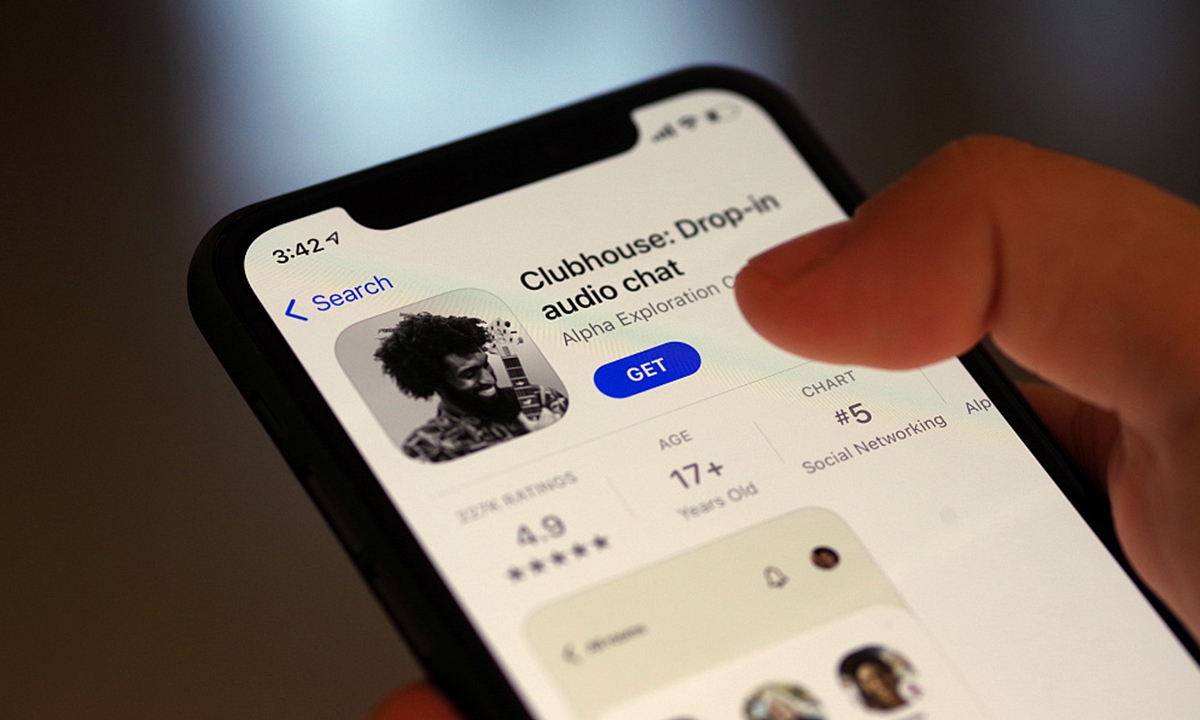IN-DEPTH / IN-DEPTH
Clubhouse is no 'free speech heaven,' say Chinese mainland users

Clubhouse file photo:VCG
US social audio app Clubhouse seems to have attracted Chinese users in recent days, with many going there for discussions on a wide range of topics. But unlike some media reports describing the app as a "free speech heaven," many Chinese mainland users said political discussions on Clubhouse are often one-sided and pro-China voices can be easily suppressed.
Clubhouse, which was launched in 2020 in the US, saw sudden popularity in the US when Tesla founder Elon Musk hosted his audio meeting on the platform at the end of January, along with other high-profile attendees such as Vlad Tenev, CEO of Robinhood.
The chat was first announced on Musk's Twitter and was also live-streamed on Youtube, boosting the app's popularity.
In the beginning, the US social audio app's demographic of Chinese users was a niche geek community because it requires an IOS system and Apple ID from outside China for downloading, and also works on an invite-only model.
But it seems that since last week, many Chinese users have been able to go to e-commerce platform taobao.com for a clubhouse invitation. Invitations to different discussion rooms can be bought for up to 300 yuan ($46.4) on the platform.
Clubhouse appeared to have become inaccessible to Chinese mainland users on Monday.
On Saturday, many users from the Chinese mainland, Hong Kong and Taiwan went to a Chinese-language room on Clubhouse to exchange opinions. This candid and direct discussion also became a hot topic on China's own Twitter-like social media Sina Weibo.
While some users hailed the discussion as an opportunity for people across the Straits to deepen their understanding, some users criticized discussions on political topics, saying they could easily become one-sided.
A Chinese man surnamed Zhao, 30, who works in Texas, US, enjoys talking about technology and culture on Clubhouse. He also joined a room of young people from the Chinese mainland and the island of Taiwan talking about the Taiwan issue.
However, he found political issues boring, as the people in the room simply repeated their own opinions, rather than discuss or debate them critically.
A 29-year-old Chinese woman surnamed Zhang, who works in a world-leading IT company in Silicon Valley, joined a chat room on Xinjiang, but left after half an hour because she was not able to bear the one-sided comments.
Zhang noted that she doesn't believe the rumors against Xinjiang mentioned in the room, as the accusations lack solid evidence, and said that maintaining independent thinking is important when joining political discussions in the Clubhouse.
"The platform doesn't even verify the authenticity of users. How can us users verify the truth of other people's statements?" Zhang asked.
She noted that only the moderator and some users in the speaker zone can speak in that room. It is difficult for people holding opposite opinions to speak. When people occasionally raised questions, other users would say: "Kick him off this room. He's a little red guard."
There is heavy psychological pressure on anyone trying to advocate opposing opinions in such an environment, said Zhang.
The sudden "popularity" of Clubhouse in China has caught the attention of some Western media and foreign journalists, with many saying that Chinese users have "flocked" to the "free speech heaven" for political topics.
However, Chinese users reached by the Global Times disagree with this view, saying that they dislike the idea of politicizing the platform and prefer high-quality talks on a wide range of topics rather than one-sided political ones.
"Currently, as the platform is still in the early stages of development, the app developers naturally want to maintain a friendly community atmosphere to attract more users. Therefore, the entire community is still relatively friendly and mostly free of offensive political content," a Chinese Clubhouse user and key opinion leader on China's Twitter-like Sina Weibo, who requested anonymity, told the Global Times.
Clubhouse provides a platform for verbal communication, and the impact of voice and narration on listeners is much greater than that of text. This also makes it easy for objective and rational discussions to become subject to emotional manipulation and it could become an anti-China political propaganda platform in a short period of time, he said.
He recalled that in the chat rooms about Xinjiang "camps," there were many people who claimed to have been in the "concentration camps" and made tearful accusations, which can easily move listeners emotionally without exploring the evidence and logic behind them.
"There is never freedom of speech when it comes to China on these social media," he said, citing the example of social media platforms such as Twitter and Facebook, where statements in favor of the Chinese government often lead to restricted viewing or accounts being banned.
"It's even more pronounced on Clubhouse because the moderator has the power to decide on all conversations and can ban statements or remove people with different views from the room at will," he said, noting that the platform could be used as a weapon by Hong Kong and Tibetan secessionists to spread their political views, and become another anti-China opinion platform in the future.
However, others argue that the spread of political views can take place on any social platform. "It's just part of the platform's content, and you can choose whether to receive it or not," one Clubhouse user told the Global Times.
"There are also users who have opened discussions to defend Chinese politics, and there are a lot of good arguments. I'm not worried about it becoming a platform for one-way political indoctrination."
"You think Clubhouse has broadened your view, but in reality it's just entering yet another information cocoon. When it rips off the mask of hypocrisy, deluded users will be at a loss," commented one Chinese netizen who uses Clubhouse.
Compared with political topics, which can be easily led into certain directions, they prefer to seek high-quality exchanges of ideas on a wider range of topics, from culture to technology, and even some amusing topics, such as different accents in China.
A Beijing-based Clubhouse user surnamed Chen spent over two hours following some chat groups on Sunday night and found out that many of them were completely different from what some Western media described.
"It's not only a platform for voicing some anti-China or anti-Chinese government comments, but a platform for sharing interesting stories, pinpointing cultural differences and to relax," she told the Global Times.
The Global Times reporter also found out there are many chat groups focused on Chinese culture, for example, learning different dialects from the Northeastern region of the country. It was akin to a mini-online talkshow, attracting hundreds of listeners at its peak on Sunday night.



